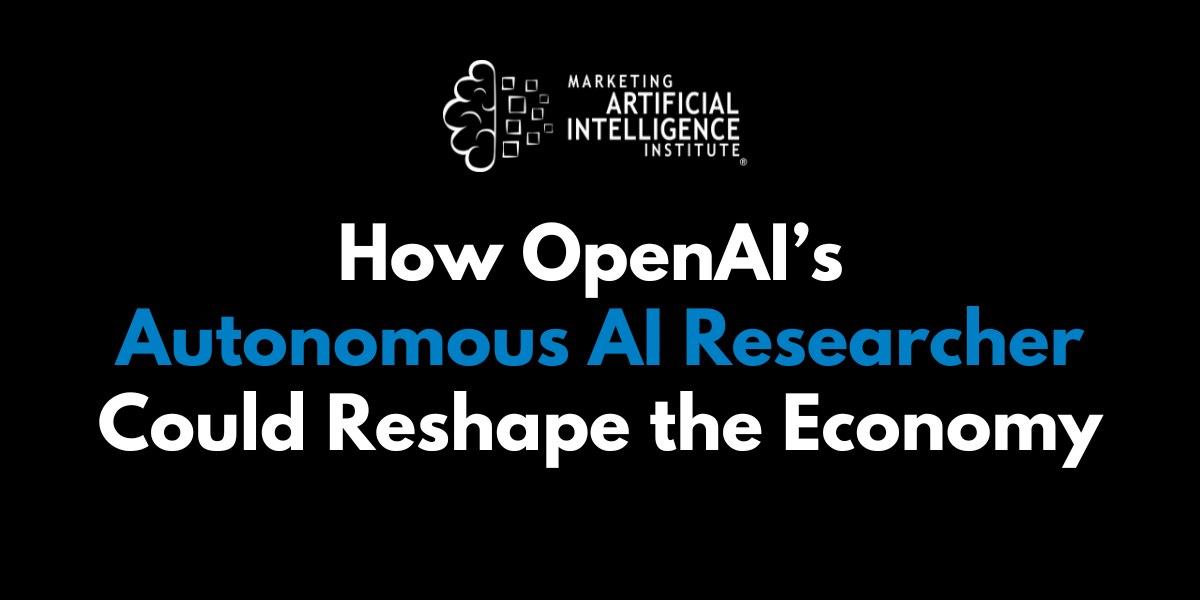OpenAI’s leadership just pulled back the curtain on one of its most consequential updates of the year.
In a recent livestream, CEO Sam Altman, Chief Scientist Jakub Pachocki, and co-founder Wojciech Zaremba revealed bold internal goals: to create an AI research intern by September 2026 and a fully autonomous AI researcher by March 2028.
In other words, they’re developing AI that can conduct scientific research, first by assisting human scientists and then by doing the research entirely on its own.
Altman called the 2028 goal “tremendously important if it works,” adding that they chose to reveal the timelines because, “given the extraordinary potential impacts, it’s in the public interest to be transparent about this.”
To unpack what this milestone really means for AI development and the future of work, I turned to SmarterX and Marketing AI Institute founder and CEO Paul Roetzer on Episode 178 of The Artificial Intelligence Show.
Why Automating Researchers Changes Everything
AI researchers are the people who invent new algorithms and theories, like the ones behind the 2017 "Attention Is All You Need" paper that launched the entire generative AI era.
Automating this role, even partially, could dramatically shift the speed of innovation. Projects that currently take human researchers months or years might be completed in hours or days. This would unlock new insights in fields far beyond AI, including medicine, material sciences, and physics.
But to do it, you need fuel.
“Once you automate research, you basically need infinite compute because there's no longer human limitations to discovery,” Roetzer says. “You can just throw them at these problems.”
While the initial focus is on AI research, Roetzer sees this as a canary in the coal mine for all knowledge work.
According to previous reporting OpenAI has extremely aggressive revenue forecasts, which project the company could top $125 billion by 2029.
A key part of that projection? Selling AI agents.
“They project that by 2029 agents alone could bring in $29 billion a year,” says Roetzer. “And this is the really important part, selling high-end AI workers ranging from $2,000 a month for what they were calling knowledge agents to $20,000 a month for research agents.”
This announcement is the first clear, public signal of how OpenAI plans to build and productize that top-tier agent. And it has massive implications for business leaders who don't employ AI researchers.
For instance, Roetzer shared a recent experience where, while standing in an airport line, he read an earnings call transcript from Coursera's CEO and instantly envisioned an "earnings call research analyst" agent.
In just five minutes, he prototyped the entire workflow for an agent that could analyze quarterly calls against his own business model, a task that would normally take hours.
“If you have the ability to build these agents and you don't even need technical ability to do them, then people like me as the CEO of a company can just envision an agent for something and just go build it,” he says.
Basically, if OpenAI can successfully automate its own most complex, high-value job, it's paving the way to automate everyone else's.
Would businesses pay for it?
"Hell yeah," says Roetzer. "If I could build agents on the fly by just having ideas, I'm saving 30 hours a quarter that I just wouldn't have done otherwise."
Mike Kaput
Mike Kaput is the Chief Content Officer at SmarterX and a leading voice on the application of AI in business. He is the co-author of Marketing Artificial Intelligence and co-host of The Artificial Intelligence Show podcast.


